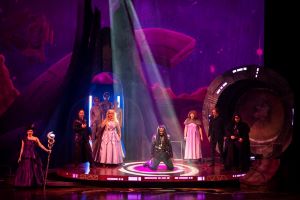Franz Josef Haydn (1732-1809), “Papa” Haydn, is revered as the Father of the Symphony (he wrote at least 104 of them) and of the String Quartet (at least 68, as well as over 40 piano trios). However, despite having spent much time laboring over his output of operas (he completed 17 of them), we rarely hear them performed today. So it was with great excitement that I prepared to hear my first live performance of a genuine Haydn opera. I was delighted: by the charming and dramatic music, by the outstanding singing and playing of the pit orchestra and by the spectacular staging and lighting which accompanied the music.
The opera in question, Orlando Paladino, composed in 1782, has been described as a “dramma eroicomico” (a drama mixing heroïc and comic elements). But in the superb production presented Friday evening at the Stevens Center by the students and faculty of the UNCSA School of Music and the A.J. Fletcher Opera Institute, the dominant element was definitely Comedy! Even the “heroic” elements were presented with tongue-in-cheek satire and more in the style of a parody than of an epic.
Oxford Languages defines a paladin as any of the twelve peers of Charlemagne’s court, and by extension, a knight renowned for heroism and chivalry. The paladin of this opera, Orlando, refers to the knight Roland, as he is immortalized in the first recognized French work of literature, Le Chanson de Roland. The excellent program notes by UNCSA emeritus faculty member Nancy Goldsmith, clarified an otherwise tangled plot and storyline.
The Queen of Cathay, Angelica, believes she is in love with Medoro, a shy and insecure nobleman. Rodomonte, another knight and also King of Barbary is the bad-tempered and bellicose defender of the virtue of Angelica, who avoids him like the plague. The joyful Pasquale, who is paladin Orlando’s squire, appears to be perpetually hungry – to the point that he almost avoids the seductive advances of the delightfully playful local shepherdess, Eurilla. The title role, Orlando, is an errant knight and paladin obsessed with Angelica. Each of these characters stubbornly fulfills their destiny, almost mechanically, except for the sorceress Alcina, the game-changer, who stops villains in their tracks and turns instigators to stone to change destiny. Alcina was beautifully sung with great drama by mezzo-soprano Danielle Romano.
Toby Bradford, tenor, is outstanding as the paladin’s squire singing beautifully, up to the top of his register, mocking the castrati of Haydn’s time by singing a lovely falsetto for a brief passage. His acting provided comic relief and his slap-stick miming with the violin brought roaring laughter from the audience. The shepherdess Eurilla, sung by soprano Jillian Hope Griffey, the first person on stage, was also very effective in later scenes as his partner, making them audience favorites.
Angelica was Carolyn Orr, soprano, who sang the coloratura passages with strength and daring and the lyrical passages with a lovely tone. Her lover, the listless Medoro, was charmingly sung by tenor David Maize with a warm rich voice with a lovely vibrato. Baritone Robbie Raso sang admirably the antagonistic Rodomonte, forever with drawn sword. In the title role of Orlando, Kameron Alston shone with his velvet tenor voice, finely handled, with elegance and nuance.
The orchestra of students sounded remarkably strong, maybe even too loud at the beginning of the opera, under the direction of James Allbritten, Music Director. Steven LaCosse directed the extremely successful staging of the opera.
The sets, designed by Gisela Estrada, lighting (by Petko Novosad) and costumes (by Logan Benson) appear to be inspired by recent scientific discoveries, such as the Hubble photos of distant galaxies, and implemented as part of the animatronics program at UNCSA. The colors of the various lighting effects were dazzling and the sets are straight out of science fiction – or a video game!
This performance was a delight to see and hear! It will be performed on Sunday afternoon and Tuesday evening. See sidebar for details.











